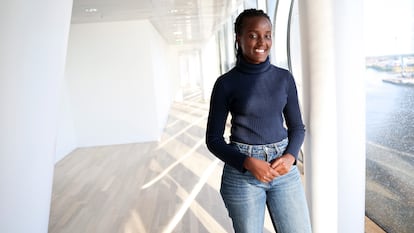Vanessa Nakate, climate activist: ‘In Africa, we cannot afford to skip school; it is easier to demonstrate in Europe’
The 26-year-old Ugandan, whose work was recognized this year by the European Parliament, says that world leaders have put aside the environmental efforts to focus on military conflicts

The same day climate activist Vanessa Nakate is giving this interview, her friend and also activist Greta Thunberg is being charged with a public order offense in the United Kingdom after being arrested at a demonstration outside an oil industry conference in London. “It’s very sad to see that the people who are demanding the protection of the planet are being criminalized,” Nakate laments over a video call. Her path in activism began in 2019 when she became the first representative in Africa of the Fridays for Future movement, founded by Thunberg; since then she has been one of the faces of the fight for climate justice, creating the Rise Up movement to provide a platform to African climate advocates. Her work was recognized this year by the European Parliament with a nomination for the Sakharov Prize for Freedom of Conscience, which was ultimately awarded to Iran’s Women, Life and Freedom movement.
Question. Your friend and colleague Greta Thunberg has been arrested on several occasions. What do you think is the reason for this?
Answer. That many felt comfortable when Greta protested with other children in school. But now that she’s older, they are saying that the protests of which she is a part of are disruptive, even criminal, but I don’t think that’s the case. It’s really sad that those that are calling for a better world are the ones being arrested and being held accountable for their opinions.
Q. What is the biggest lesson you have learned from Greta?
A. It’s something that she often says: “No one is too small to make a difference.” We grew up in societies where it’s very hard to think that a young person would actually spark off such a powerful movement, but I’ve learned that it doesn’t matter how old or how young you are, what really matters is the action that you take.
Q. What is the biggest difference about protesting in Africa compared to what you see, say, in Europe?
A. Since I started, it was always hard to organize big strikes on the streets, like what we were seeing in other countries, especially in Europe, because of how hard it is to get permits, and also the resources, to organize them. Also, it’s very hard for students to skip school here, because we all grow up being told that education is the key to success, education is what will lift your family out of poverty. It is much easier for students to do that in Europe.
Q. What do you think of the attacks on museums and works of art?
A. I wouldn’t be in the right place to say that this is the best form of activism. I have been an activist for almost five years now; there was a generation of activists before me and one will come after me. However, many times people ask themselves the question of how extreme should climate activism go, but then they never ask themselves how extreme should environmental destruction go. That is where I see the challenge. The question is how extreme should we let environmental destruction go before we actually have our leaders wake up and do what is really needed to address one of the greatest challenges that humanity faces.
Q. The wars, first in Ukraine and now in Gaza, have changed the security and defense priorities of many European countries. Do you think that the fight against climate change has lost the focus it had when you started activism?
A. We’ve obviously had some leaders go back on the targets that they had set in regards to climate. But we’re living in an interconnected world, and everything is a piece that connects to another piece and in the end completes all of us. When we talk about climate justice, we’re not just talking about installing solar panels. It’s about the well-being of the people; we have to address everything that is affecting people on our planet right now.
Q. Do you consider yourself an optimist?
A. Yes, and it gives me the strength to do what I do. It’s not easy to see people in my country who have been displaced or who can no longer farm their land, but knowing that my work can help them in some way is what drives me to go to events and protests or give interviews like this one. Even so, this fight is bigger than me: it’s a fight for all of us. It’s a fight for the present generation, but also for the coming generations.
Q. Will you attend COP28 at the end of November?
A. Yes, I’ll be there. I need to be there.
Q. It will be held in Dubai, in the United Arab Emirates, one of the largest oil producers in the world...
A. I will go with my mind set on mobilizing and demanding responsibility from the leaders, as I have done in previous years. We activists cannot decide where these events are held, what we can do is influence these spaces to promote an agenda in favor of the fight against climate change. If we just sit back and relax and say that we’ve already lost this because the COP is being held in the UAE, then it will be even more problematic.
Sign up for our weekly newsletter to get more English-language news coverage from EL PAÍS USA Edition
Tu suscripción se está usando en otro dispositivo
¿Quieres añadir otro usuario a tu suscripción?
Si continúas leyendo en este dispositivo, no se podrá leer en el otro.
FlechaTu suscripción se está usando en otro dispositivo y solo puedes acceder a EL PAÍS desde un dispositivo a la vez.
Si quieres compartir tu cuenta, cambia tu suscripción a la modalidad Premium, así podrás añadir otro usuario. Cada uno accederá con su propia cuenta de email, lo que os permitirá personalizar vuestra experiencia en EL PAÍS.
¿Tienes una suscripción de empresa? Accede aquí para contratar más cuentas.
En el caso de no saber quién está usando tu cuenta, te recomendamos cambiar tu contraseña aquí.
Si decides continuar compartiendo tu cuenta, este mensaje se mostrará en tu dispositivo y en el de la otra persona que está usando tu cuenta de forma indefinida, afectando a tu experiencia de lectura. Puedes consultar aquí los términos y condiciones de la suscripción digital.









































